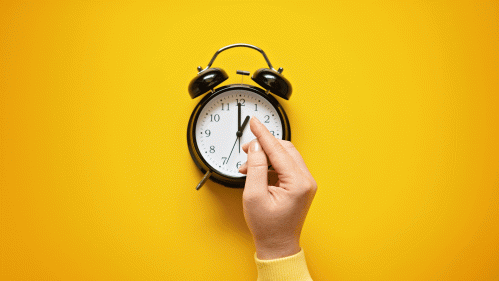Springing Forward: How to Navigate Moving the Clock Ahead

Rutgers circadian rhythm and sleep experts discuss the impact of the time change on mental and physical health
On the morning of March 10, most people in the United States will turn their clocks ahead by one hour in observance of daylight saving time.
Daylight saving time changes our circadian rhythm, which can disrupt our biological clocks and impact our health, according to Rutgers experts. Understanding how the circadian rhythm works and planning your sleep schedule can make the transition easier.
Helmut Zarbl, director of the Rutgers Environmental and Occupational Health Sciences Institute and chair of the Environmental and Occupational Health Department at the Rutgers School of Public Health, who is an expert in circadian rhythm and its influence on sleep-wake cycles, and Andrea Spaeth, director of the Rutgers Sleep Lab, discuss how you can best navigate the time change.
How does daylight saving time affect the body’s circadian rhythm?
Zarbl: Circadian rhythm regulates many important biological processes, such as hormone production and sleep patterns, and is largely controlled by external cues in the environment – mainly light. Changing sleep-wake cycles by an hour has an effect on our circadian clock. Since light is normally a key regulator of our biological clock, the change will shift the phase of our rhythm away from that of the central pacemaker.
As with any phase change, this will cause disturbances in sleep, metabolism, mood, bodily functions and productivity.
What are some common effects of the time change on our bodies?
Zarbl: We may feel sleepy, listless, stressed and tired for a while. Daylight saving time–associated changes result in higher rates of automobile and workplace accidents. A few studies have even suggested a slight increase in heart attacks and stroke, probably in those already at a higher risk.
How can people avoid the negative effects of the time change?
Zarbl: As with any change in sleep cycles due to situations like shift work or jet lag, it takes about a week to reset your biological clock. Do not fight the change or keep referring to the previous time schedule. The sooner you adapt, the sooner you will feel normal again, so adjust your eating and sleep schedules accordingly. You change the clock at 2 a.m. on Sunday, so don’t wait until Monday to make the necessary change. You should also avoid using caffeine and other stimulants or drugs to help adjust.
Spaeth: Exposing yourself to natural light in the morning when you wake up can help your body adjust more quickly. Taking a brief walk outside before work is a great way to synchronize your internal clock and help you sleep better at night.
How can parents help their kids prepare for the time change?
Spaeth: The effects for children are similar to adults. For most kids, a gradual shift – say, about 15 minutes a night – in their bedtime will be easier than a sudden one-hour shift. So, parents can help by starting the shift gradually a few nights before the time change.


